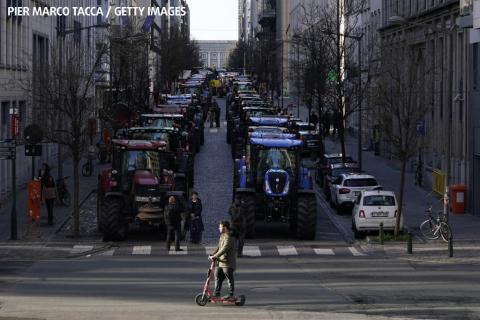European Economic
and Social Committee
There will be no green deal without a social deal
by the EESC Workers' Group
On 26 February, farmers and their tractors blocked the streets of Brussels in protest, for the second time in a few weeks. In stark contrast with the usual array of suits and well-trimmed haircuts, the streets of the European district were taken over by trucks, tractors, hay and piles of burning tyres. The complex reasons behind the farmers' protest range from the CAP and environmental policies to completely unrelated issues.
The truth is, the European countryside is in a difficult situation, and has been for a long time. The Workers’ Group and the EESC as a whole have repeatedly warned that there would be no green deal without a social deal. And while it could be tempting to dismiss this as another by-product of Brussels jargon, it would be a grave mistake. The countryside is facing real problems. They include intermediaries paying producers a pittance but charging outrageous consumer prices; insufficient aid for undertaking environmental reforms; and (non-fair) free trade, harsh working conditions and climate change.
The response of the European Commission, which hastily ditched pesticide requirements, is even more worrying than the lack of proper consultation and engagement with social partners and the inaction at social policy level. As with environmental measures, abandoning these measures might buy our politicians a little time, but it will also push us beyond the point of no return with the environment.
On top of this, with the elections coming, the far right is trying to capitalise on the discontent and, to some extent, is succeeding in steering the protest against the SDGs, the Green Deal and Agenda 2030.
